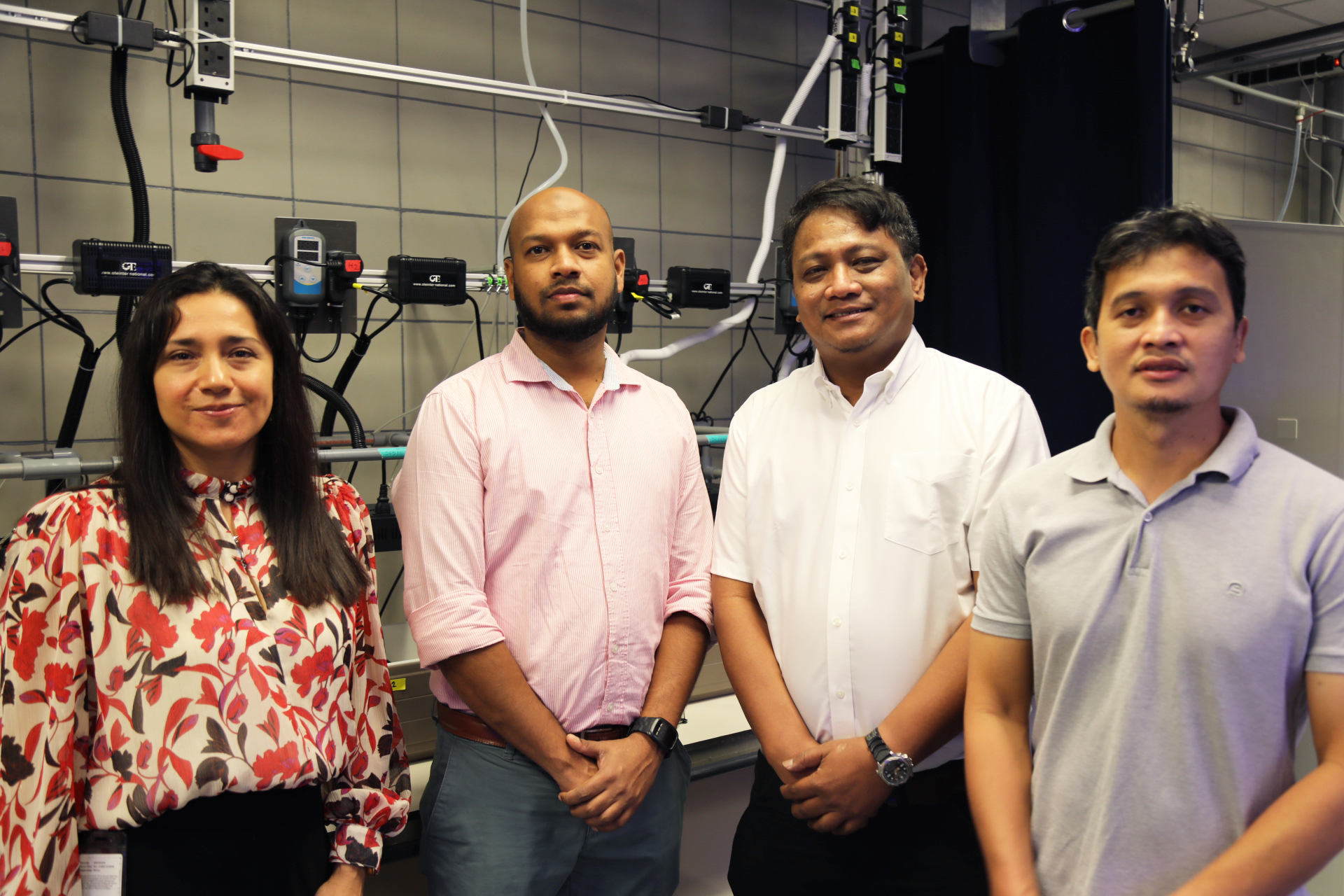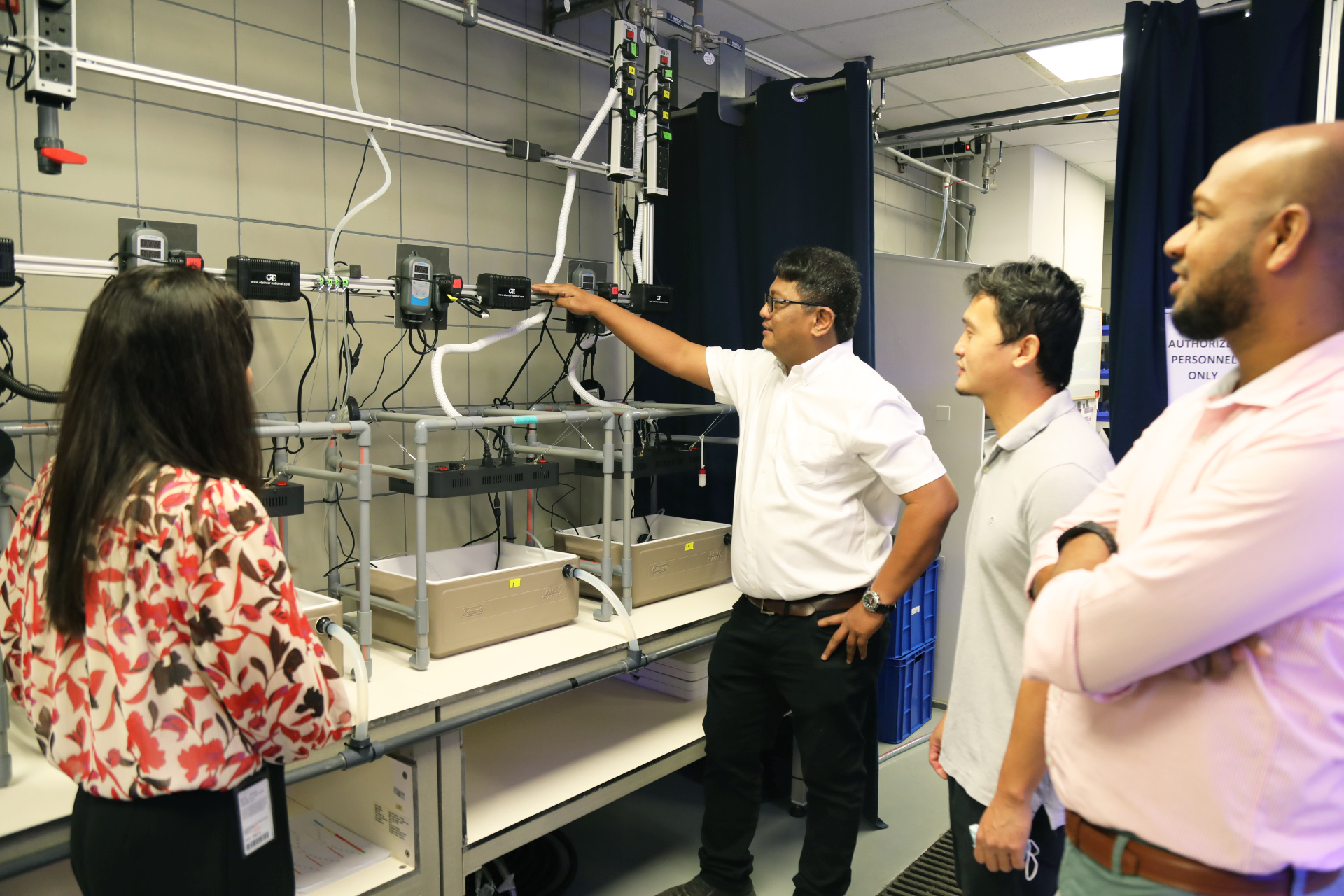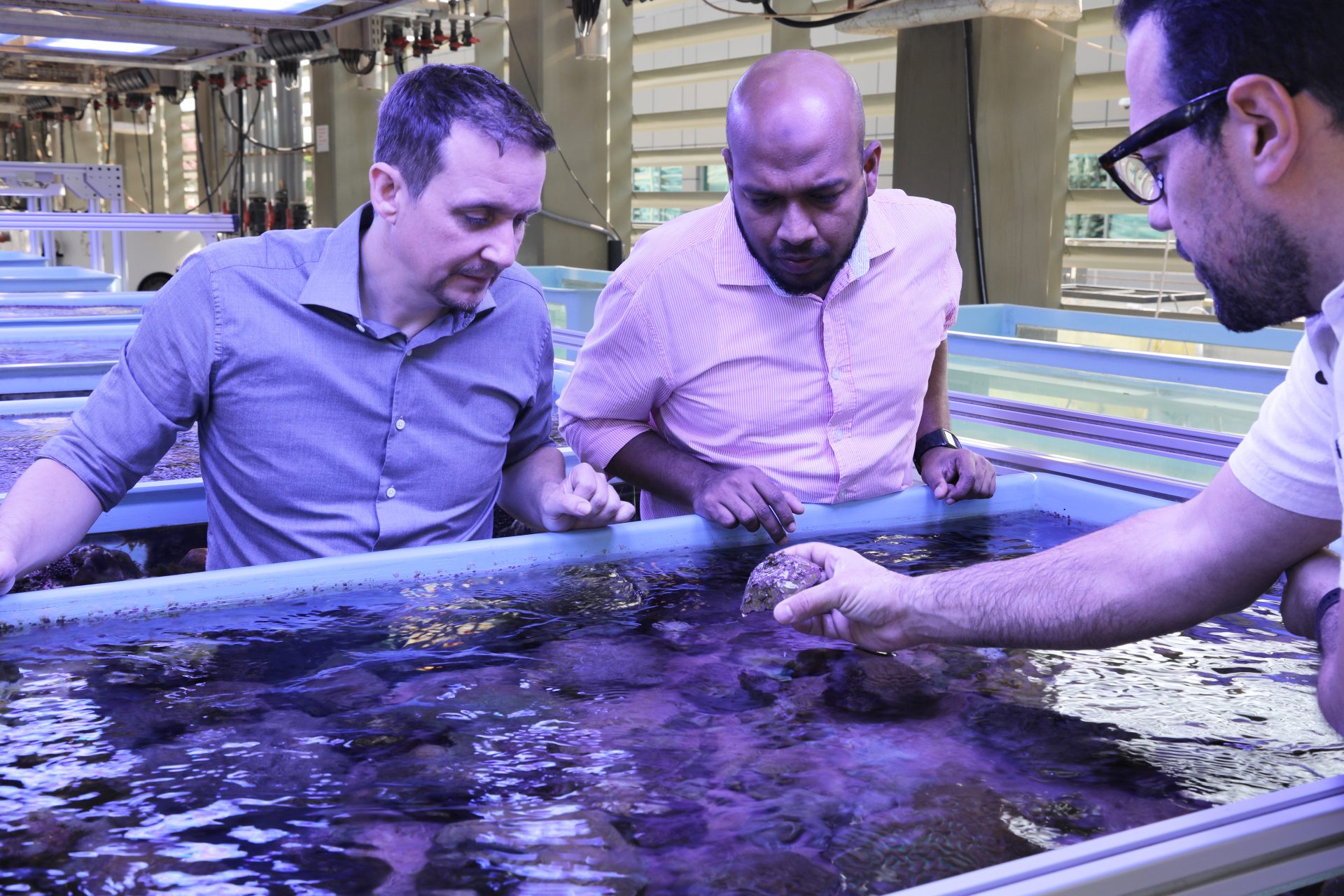Red Sea corals maintained in an aquarium at the Seawater Laboratories for Aquatic Biosystem Simulations (SeaLABS), part of KAUST's Coastal and Marine Resources Core Lab. Photo by Khulud Muath.
The KAUST Coastal and Marine Resources Core Lab (CMR) is committed to offering the best operational support and expertise to all marine research activities at KAUST. Featuring exquisite wet lab resources, the Seawater Laboratories for Aquatic Biosystem Simulations (or SeaLABS) allow researchers to tackle different global challenges, from food security to environmental protection. And to assist its users, SeaLABS multidisciplinary team is available in every research step to ensure the success of any project.
Meet the Team

Some of the members of the SeaLABS team. From left to right: Dafne Lopez Sandoval, Nabeel Alikunhi, Zenon Batang, and Freddie Lampos, Jr.
Leading the SeaLABS team is Zenon Batang, a Marine Production and Environmental Studies doctorate who has been part of the CMR team since its genesis twelve years ago. "CMR is unique for having all the essential marine research facilities on a centralized location by the Red Sea, [and] SeaLABS opens a new dimension (…) by allowing for the conduct of scientific studies in a controlled laboratory setting," he said.
Joining Batang, the team comprises four other members who support wet lab research operations at various degrees. Staff scientist Nabeel Alikunhi, a Ph.D. in Mangrove Ecology, attends to wet lab operations, handles the regular water quality monitoring of seawater supplies and effluents, and ensures that wet lab instruments are adequate to meet the specific needs of users during their experiments.
Leading the development and implementation of the SeaLABS Quality Management System (QMS) is senior technical specialist Ioannis Georgakakis. Holder of a master's degree in Management, Georgakakis' role has been crucial to the lab's research enhancement plan and ongoing bid for international accreditation. He is also responsible for maintaining the general safety and emergency plans of the SeaLABS.
Finally, the team has recently welcomed its last two members: Daffne Lopez Sandoval and Freddie Lampos, Jr. Being an experienced researcher with a Ph.D. in Marine Ecology, Lopez-Sandoval will strengthen the team on user engagement, contribute to experimental design and strategy, support experiment monitoring, and help to ensure compliance with animal care and welfare protocols. Lampos, who holds a B.Sc in Biology and majored in marine biology, will assist in experimental setup installation and maintenance, and reinforce the team's capacity to enable routine monitoring tasks under the new quality management regime of SeaLABS.

Thanks to the diverse expertise provided by each team member, SeaLABS is able to deliver tailored-made solutions to tackle specific research questions. The team provides continuous support throughout experiments to ensure all parameters of established setups are optimal from start to finish.
Materializing ideas
To understand complex events happening in the natural environment, performing smaller-scale experiments in controlled settings is often necessary. Therefore, the regular monitoring of aquarium conditions, water quality, and the life support system (LSS) services of the wet lab facility are crucial to guaranteeing the integrity of organisms under study and the data arising from any experiments.
At the SeaLABS, Batang's team is essentially responsible for translating research programs and ideas into well-functioning experimental setups, from design to assembly. Once the systems are operational, the team further supports users by ensuring experimental setups follow the study requirements. In addition, the team consistently strives to ensure compliance with applicable health, safety, and environment (HSE) guidelines and standards; regularly monitors the conditions of experimental setups; and provides first response during emergencies where ongoing experiments may be compromised.
According to Batang, the current high occupancy of the SeaLABS reflects the commitment and motivation of the team. "The mere fact that we are nearing full capacity in wet lab space utilization is a testament to the growing importance of the SeaLABS in enabling marine science education and research at KAUST," he added.

KAUST Associate Professor Manuel Aranda (left) and research scientist Sebastian Schmidt-Roach (right) from the Coral Symbiomics Lab inspect their aquaria setup at SEALabs, harboring Red Sea corals. SEALabs' Alikunhi (center) is routinely involved in instrument and equipment monitoring to ensure aquaria setups run in optimal conditions.
Big problems, bold solutions
Strengthening the commitment of KAUST in contributing to the Saudi national development ambitions under the Vision 2030 framework, and in support of the Kingdom's mega-projects, the SeaLABS team has already supported collaborative research projects with vital strategic goals ranging from environmental sustainability to food security.
One such project focuses on coral reef restoration and is currently led by KAUST Associate Professor Manuel Aranda from the Red Sea Research Center (RSRC). To achieve the project's different goals, the SeaLABS team assisted Professor Aranda's group in setting up and maintaining the necessary aquaria system to sustain live corals collected from the field and brought to the SeaLABS for experiments. This research initiative aims at developing strategies to help corals cope with climate change, contributing to the global effort of restoring coral reefs.
"All our work relies heavily on the support provided by the CMR team, from providing the boats and materials to collect the corals to the provision and maintenance of the aquarium systems. Without their constant help, none of this work would be possible," said Aranda.
Another vital project is the Aquaculture Development Program, a collaboration between KAUST and the Saudi government, in line with the strategic goals of Vision 2030. The program aims to develop new technologies for marine aquaculture in the Kingdom. Current research investigates the viability of growing established and new aquaculture fish species in floating net cages along the Saudi Red Sea coast. The SeaLABS team was pivotal to this project's ongoing success by providing operational support and setting up experimental fish tanks.
To Batang, the type of projects his team is involved in, combined with the infrastructure capabilities of the SeaLABS, make the daily work routine challenging but rewarding. "There is a constancy in dealing with new research initiatives that fuels enthusiasm (…) and the collective motivation of the SeaLABS team. This enthusiasm allied with the synergy between CMR personnel to build close and coordinated working relationships makes us a family more than simply an organization," he concluded.

---khulud-m-0561.tmb-th950x345.jpg?Culture=en&sfvrsn=d60762f4_1)